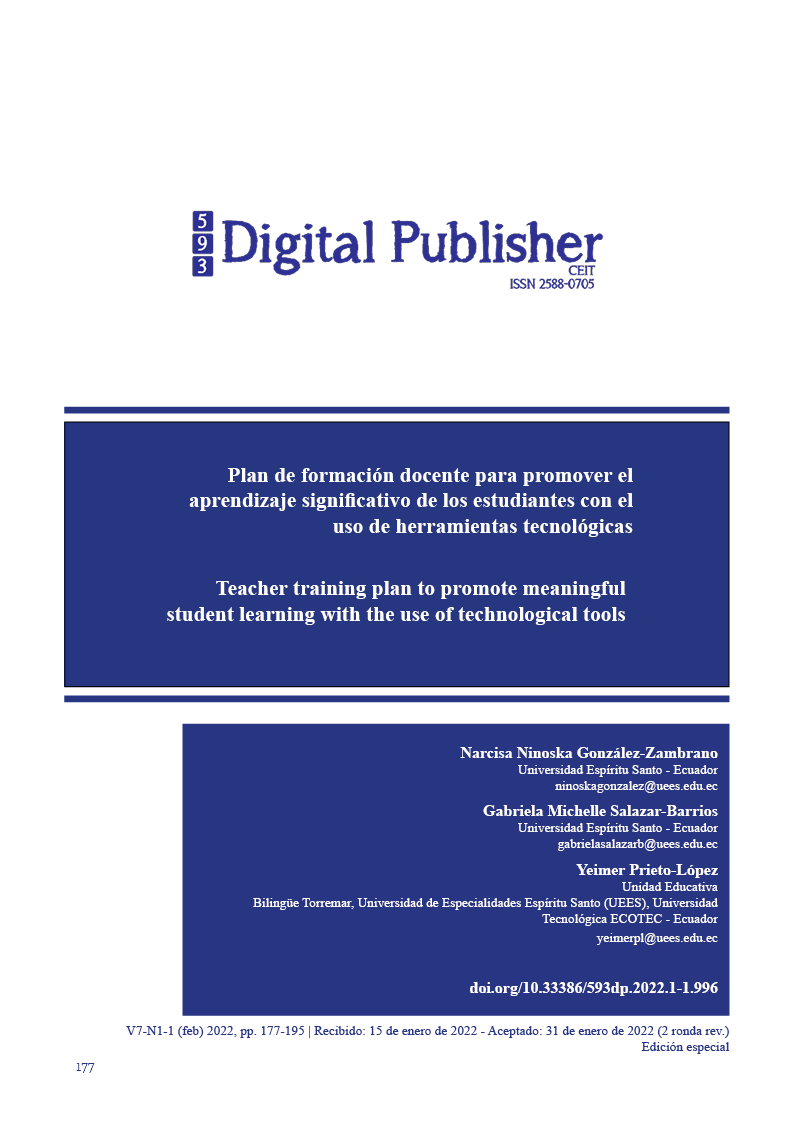Teacher training plan to promote meaningful student learning with the use of technological tools
Main Article Content
Abstract
The development of the subject of study on teacher training to promote meaningful student learning with the use of technological tools in the Inter-American Bilingual Educational Unit, in Ecuador, has its main objective in designing a professional training plan aimed at teachers linked to the use of ICT. Therefore, the theories that support this study are the pedagogical approach, meaningful learning theory, constructivism and connectivism, as well as the theoretical bases that support the use of ICT in the teaching and learning process of students. For this, the methodology will be used with a quantitative approach that will allow to identify, analyze, plan and assess a set of didactic strategies aimed at promoting meaningful learning in students in this research context. Likewise, the methods of analysis, synthesis and interpretation of data collected through a survey directed at teachers and institutional coordinators were used. Regarding the results, it is expected to be able to achieve the proposed objectives and that this research contributes to future academic studies, whose contribution focuses on a proposal that can be implemented in other contexts where the need to train teachers in the use of the tools is observed.
Downloads
Article Details

This work is licensed under a Creative Commons Attribution-NonCommercial-ShareAlike 4.0 International License.
1. Derechos de autor
Las obras que se publican en 593 Digital Publisher CEIT están sujetas a los siguientes términos:
1.1. 593 Digital Publisher CEIT, conserva los derechos patrimoniales (copyright) de las obras publicadas, favorece y permite la reutilización de las mismas bajo la licencia Licencia Creative Commons 4.0 de Reconocimiento-NoComercial-CompartirIgual 4.0, por lo cual se pueden copiar, usar, difundir, transmitir y exponer públicamente, siempre que:
1.1.a. Se cite la autoría y fuente original de su publicación (revista, editorial, URL).
1.1.b. No se usen para fines comerciales u onerosos.
1.1.c. Se mencione la existencia y especificaciones de esta licencia de uso.
References
Area, M. (2016). Ser docente en la escuela digital. Suplemento Profesional de Magisterio.
Ausubel, D. P. (1963). Psicología Educativa. México: Trillas, México. http://www.arnaldomartinez.net/docencia_universitaria/ausubel02.pdf
Cárdenas, A. (2016). El desarrollo profesional docente en educación básica primaria. Revista Latinoamericana de Estudio Educativos, 12(1), , 39-52.
Chen, C. (21 de 05 de 2019). Significados. https://www.significados.com/tic/
CIESPAL. (2018). Competencia y Uso de los medios digitales - Jóvenes y Cultura Digital. (G. D. Galindo, Ed.) Revista Latinoaméricana de comunicación - CIESPAL, 12/28.
Cohen , N., & Gómez, G. (2019). Metodología de la investigación, ¿Para qué? Buenos Aires : Editorial Teseo .
Cortés, J. (2021). El estrés docente en tiempos de pandemia. Dilemas contemporáneos: educación, política y valores, , 8(1).
Echeverría Sáenz, A. C. (2014). Usos de las Tics en la docencia universitaria: Opinión del profesorado de educacación especial. Revista Electrónica “Actualidades Investigativas en Educación”, Volumen 14(Número 3), 3/25. Recuperado el 17 de 9 de 2020, de https://www.scielo.sa.cr/pdf/aie/v14n3/a12v14n3.pdf
Falcón, M. (2016). La educación y su relación con las nuevas tecnologías de la información y las comunicaciones. MediSur. http://scielo.sld.cu/scielo.php?script=sci_arttext&pid=S1727-897X2013000300006
Gaitan, S. (1 de Junio de 2018). Importancia de la formación docente en la actualidad. Nexos. https://educacion.nexos.com.mx/?p=1285
Hernández, Fernandez, & Baptista. (2006). Metodología de la investigación (Vol. Cuarta edicion). México. http://187.191.86.244/rceis/registro/Metodolog%C3%ADa%20de%20la%20Investigaci%C3%B3n%20SAMPIERI.pdf
Hollebrands, K. (2020). ¿How can teachers use technology in the classroom? Ask the Expert Series.
Jhandry, C., & Villacis, L. (2016). Métodos teóricos de investigación y métodos empíricos deinvestigación.01. doi:https://es.scribd.com/doc/316497233/metodos-teoricos-y-metodos-empiricos
Moreira , P. (2019). Las tic en el aprendizaje significativo y su rol en el desarrollo cognitivo de los adolescentes. Revista de Ciencias Humanísticas y Sociales, 4(2), 1-12.
Nieva, J. y Martínez, O,. (2016). Una nueva mida sobre laformación docente. Revista Universidad y Sociedad, 8(4), , 14-21. http://scielo.sld.cu/scielo.php?script=sci_arttext&pid=S2218-36202016000400002&lng=es&tlng=es.
Picton, I. (2019). Teachers' Use of Technology to Support Literacy in 2018. A National Literacy Trust Research Report.
Rivas, F. (1997). El proceso de Enseñanza/Aprendizaje en la Situación Educativa. Madrid - España: Ariel.
Rivero, V. (2016). Bases teóricas sobre el uso de las TIC en Educación. Venezuela: httt://www.rebi.luz.eduv.
Rodríguez Jiménez, A. (01 de 03 de 2017). Métodos científicos de indagación y de construcción del conocimiento. Rev. esc.adm.neg. No. 82, 05. doi:DOI: https://doi.org/10.21158/01208160.n82.2017.1647
Schunk, D. H. (2012). Teorías de aprendizajes, Una perspectiva educativa (Vol. Sexta edición). (F. d.-U. México, Ed.) México: Pearson Educación.
Totano , M. (2017). El docente y el uso de herramientas tecnológicas de enseñanza-apredizaje en la Educación Básica Ecuatoriana. Universidad Técnica de Babahoyo.
Tumino, & Bournissen. (2016). Conectivismo: hacia el nuevo paradigma de la enseñanza por competencias. ESI: European Scientific Journal, 1-17.
UNESCO. (2014). Enseñanza y Aprendizaje: lograr la calidad para todos. Obtenido de UNESCO: http://unesdoc.unesco.org/images/0022/002256/225654s.pdf
Unesco. (2020). Las TIC en la educación. Organización de las Naciones Unidas para la Educación, la Ciencia y la Cultura: https://es.unesco.org/themes/tic-educacion
UNICEF. (2015). Programa TIC y Educación Básica. Fondo de las Naciones Unidas para la Infancia, Buenos Aires .
Valero, N., Castillo, A., Rodríguez, R., Padilla, M., & Cabrera, M. (2020). Retos de la educación virtual en el proceso enseñanza aprendizaje durante la pandemia de Covid-19. Dominio de las Ciencias, 6(4).
Vargas, G. (2020). Estrategias educativas y tecnología digital en el proceso enseñanza aprendizaje. Cuadernos Hospital de Clínicas, 61(1).
Villalón, J. C. (2015). La Metodología de la Investigación en el Derecho del Trabajo. España: Temas Laborales núm. 132/2016. Págs. 73-121. doi:file:///C:/Users/user/Downloads/Dialnet-LaMetodologiaDeLaInvestigacionEnElDerechoDelTrabaj-5446475.pdf
Viñals, A., & Cuenca , J. (2016). El rol del docente en la era digital. Revista Interuniversitaria de Formación del Profesorado, 30(2), 103-114. https://www.redalyc.org/pdf/274/27447325008.pdf
Vital , M. (2019). Ensayo de los principales usos de la Tecnología Educativa. Universidad Autonóma del Estado de Hidalgo .




